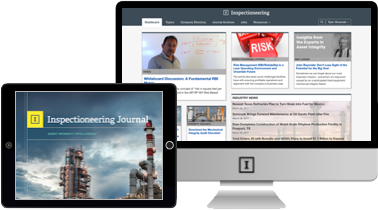Scot, will you share with the IJ readership when and how your career started in the Oil and Gas industry and in what capacity, and how you got to where you are now?
SH: I completed my BS degree in chemistry in 1971. After completing my active service commitment in the US Air Force I entered the workforce as a quality control chemist for Dayton Tire Company. It didn’t take long to figure out that the opportunities and entrepreneurial spirit in the oil and gas industry were much more suited to my style. In 1973 I started working for Champion Chemicals as a technical service chemist. Less than a year later I joined ARCO in the oilfield chemicals division based on some work I had done for them. As a technical service chemist supporting the sales force I learned the value of applied problem solving. I entered the company as a bench chemist and left as a water treating chemicals supervisor with a specialty in corrosion inhibition.
My association with Hess started in 1979 as part of an ARCO team awarded a ‘no service’ oilfield chemicals contract. This was a new concept in the business at that time as oilfield chemicals were typically sold with service included, which accounted for about 40% of the cost to the customer. I started with Hess in 1980 as a corrosion engineer. What a ride! I have had the opportunity to reinvent myself every 3-5 years to remain current and provide relevant support to Hess operations. Initially, I provided oilfield chemicals formulation and QA/QC support for chemical bids for all Hess operated regions in the US. I expanded my corrosion engineering support to include cathodic protection, coatings and materials to one of three production regions in the US. I got field experience during a move to West Texas to provide onsite corrosion engineering support for a larger region which included a Carbon Dioxide tertiary recovery project.
Soon after PSM was legislated I shifted my focus from production operations to gas plant operations. In addition to plant corrosion engineering I provided mechanical integrity (MI) support to Hess US gas plants and successfully completed API 510 and 570 certification examinations. I initiated and matured the MI programs for the company’s gas plants. I continue to be actively involved as an advisor to the company’s plant inspectors, Chuck Easterbrooks and Michael Westbrook, who are onsite and owners of the process.
Currently, I am an advisor to global operations in the area of MI and also serve as the technical expert for the global integrity management (IM) project. Thisprojectwasinitiatedafterproduction management considered an area worthy of additional focus.
What type of company is the Hess Corporation?
SH: In a word - Outstanding. I made the decision to work for Hess during my initial interview. The interviewers projected a corporate philosophy that
embraced ‘out of the box’ thinking. Hess welcomed the innovative spirit that I had demonstrated during my work on the ‘no services’ oilfield chemical package together and thought that the Hess philosophy was very compatible with my style. In essence ‘You can do anything you think you are big enough to do.’ In almost 28 years Hess has empowered me to do just that!
I am extremely proud of Hess and the metamorphosis they have made to a first class Exploration and Production Organization and Company.
That said, there are a few bumps in the road primarily as a result of the explosion in hiring that has occurred over the past 5 years. There have been challenges in integrating the best of the corporate cultures the new hires bring into the existing Hess culture, for sure. Overall, the changes have been for the better. And with such a favorable business climate the opportunities are abundant. Exciting, yes, but a little overwhelming at times.
Overall, I don’t know another company that offers more of what I want in a job and that is why I am still here.
What types of businesses do they operate, in what parts of the world are they located and what peculiar issues do you face, in your job, because of their external environments?
SH: Hess views itself as an independent with onshore and offshore production, refineries, retail outlets and other energy related ventures. We have global production operations - North Sea, Russia, Africa, SE Asia and the US.
Most of the issues I currently face are related to initiating Integrity Management (IM) programs on a global scale to minimize operational risk in our assets. The number of assets and their locations dictate that they cannot all be done simultaneously with current staffing and contractor support levels. Prioritization of risk by asset, business unit and region is a complex activity. The task becomes more difficult when issues relating to existing workload in operations, cultural differences and competency gaps are considered.
Many of the IM processes are mature in PSM or similarly regulated assets. In some production operations, however, they are non existent. Another significant issue is that of building a technical support structure with responsibility for IM.
What assets are you responsible for?
SH: I am responsible for providing corrosion engineering support to the gas plants. In practice, I work with global production and gas plants operations and engineering staff on corrosion engineering, and global IM and MI issues, as needed.
What do you see as the most exciting advancements in the areas of inspection and fixed equipment reliability in the last 5 years?
SH: Certainly, the continuing effort to adapt risk based inspection software to production operations has to rank right up there and it is still evolving. As a member of the API RBI user group I appreciate the refining industry experience and the detailed basis of technical expertise contained in the API RBI software. The refining industry has done a lot of work in contributing to the development of world-class RBI software. I am excited about tapping into this and developing a similar product that is more closely aligned to the risk and inspection issues related to production operations and applying it to the upstream business. Toward that end and with Lynne Kaley’s (Vice President, Equity Engineering Group) assistance Hess has used the software to provide senior management with a high-level relative-risk assessments for our global producing assets – onshore production, offshore platforms and gas plants. In addition, we used a modification to the Management Systems questionnaire contained in the API RBI Software to identify IM pockets of excellence in management processes and areas requiring improvement. I appreciate the level of technical effort that has gone into the development of the API RBI technology and software and the fact that the technical basis is documented, and available in the public domain. Again, this makes the approach unique in the industry.
What do you see as the future for improvement of fixed equipment reliability programs in the next 5 years?
SH: There is a need to take the best that the existing technology has to offer and apply it to the upstream segment. In the post Texas City environment many of my industry friends have come to the realization that integrity management programs are needed. But the question of how to do it always comes up. Bringing the inspection expertise up to a level approaching that in the refining industry may become a requirement in the future
What are your top 4 biggest challenges for today and the near future?
SH:
- Continuing adaptation/development of RBI software for upstream operations,
- Finding the right organizational structure for integrity management
- Providing global integrity management support
- Improving contractor inspection quality
Where do you see answers to these challenges will come from?
SH:
- RBI software development teams must come to grips with the need to expand the technology to fit the task for upstream operation by adapting where feasible and developing new technology where needed. Production operations must commit the resources to support this effort.
- Management must ‘right size’ the IM organization and determine its ‘best fit‘ in a rapidly growing and changing upstream industry
- A deeper level of understanding of the inspection methods is needed by company employees in order to be qualified to determine contractor competency
- Inspection companies should high grade their employment practice and continue to invest in employment packages that encourage long term commitment by inspectors.
What are your most commonly used NDE methods, today, for the various business sectors, by business?
SH: In the gas plants NDE methods include the generic standards like visual examination, compression wave UT, WFMT, PT, RT, MFL, etc. In the field locations common methods are visual examination and UT. We tend to do more in the area of corrosion monitoring in the field and look at water chemistry, coupons and electronic methods such as resistance probes, galvanic and PAIR probes.
What advanced methods is Hess using?
SH: Plants use phased array, longitudinal and shear wave UT, IRIS, EMAT, etc. Field locations use potentiodynamic polarization, MFL, smart pigs, etc.
Inspectioneering offers our sincere thanks to Scot for his time and sharing. I am sure our readers will find his insight both practical and valuable and we look forward to hearing from him again.

















Comments and Discussion
There are no comments yet.
Add a Comment
Please log in or register to participate in comments and discussions.